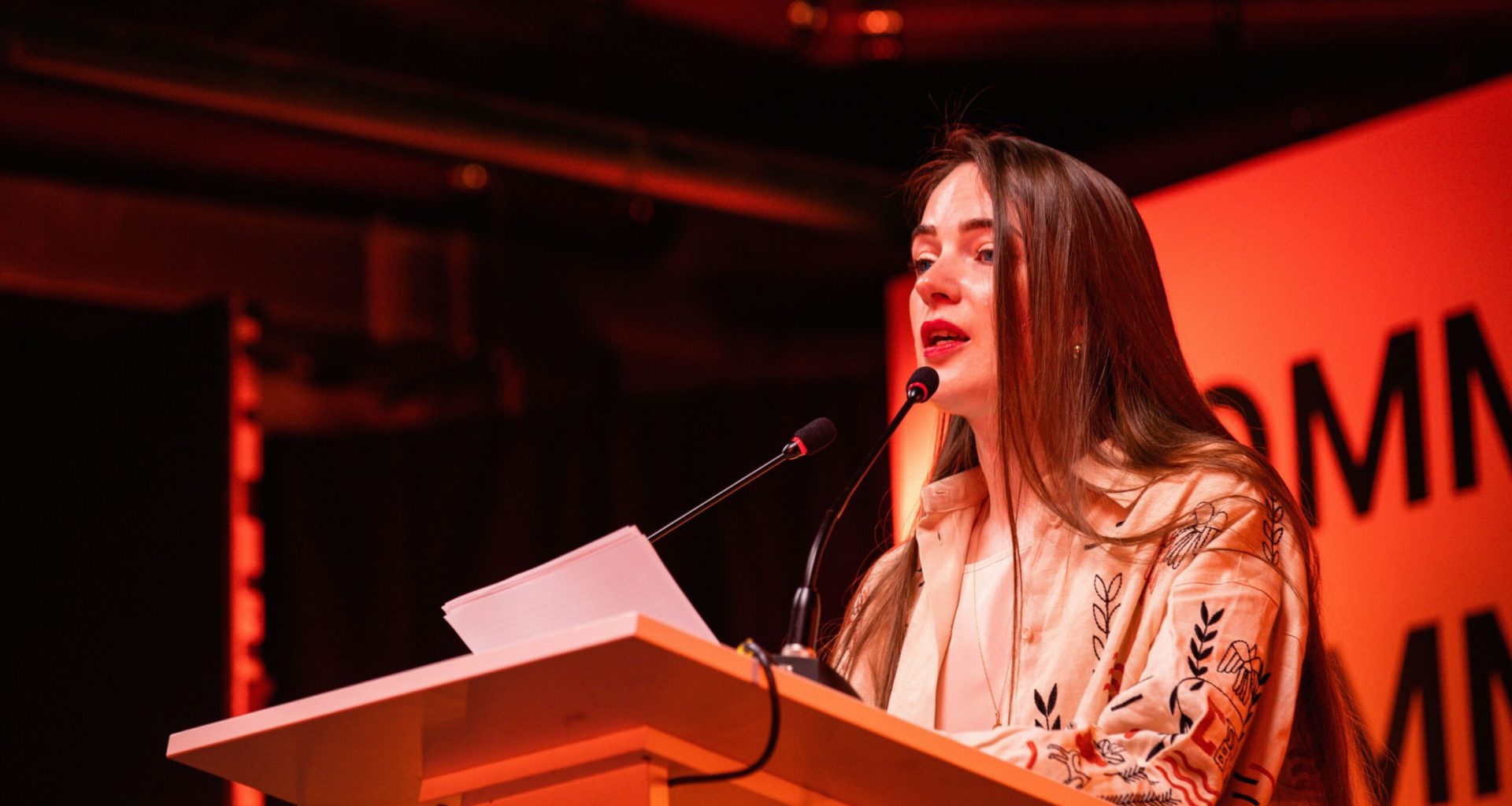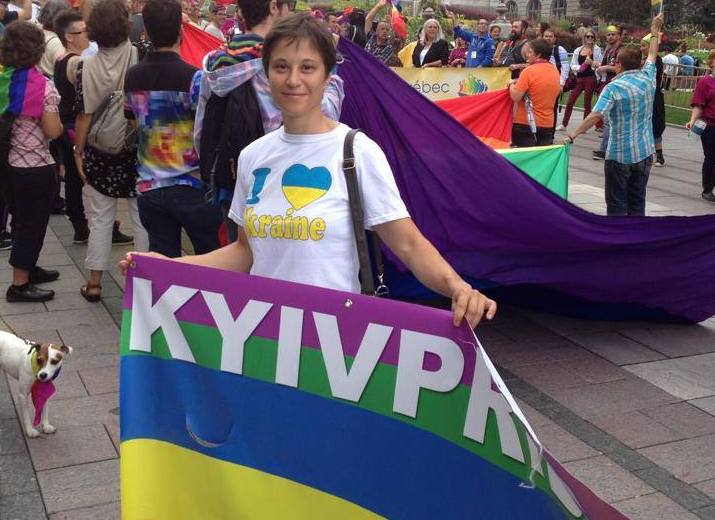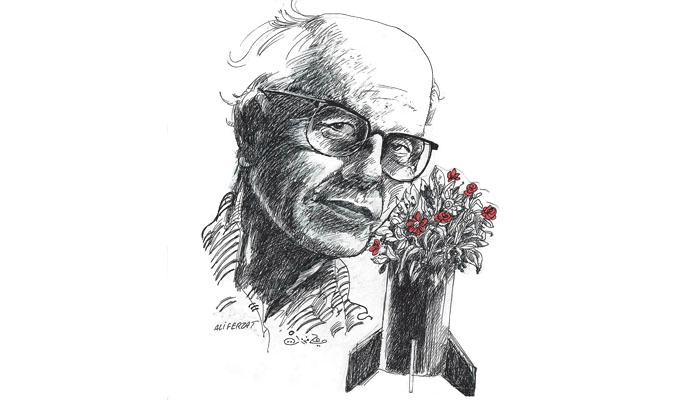She underscored that occupation does not reduce human suffering but simply makes it invisible. Matviichuk called for a change in the global legal system, demanding that war criminals and the politicians who start war be punished while the war are ongoing, not after it is over. She stressed that the Russia-Ukraine war is not a war between two states but between two systems – authoritarianism and democracy. Matviichuk believes that despite everything, the story of Ukraine is a life-affirming one.
After Russia's full-scale invasion of Ukraine, many familiar things remained there in the pre-war world, for example, the language, its architecture and the context of its functioning. We faced the fact that it is difficult to find the right words to convey the experience of living through war to the world.
It turns out that there is an immense difference between reading the news, listening to survivors, seeing videos of destruction, and living this experience firsthand.
Usual words seem not suitable for this, and there are simply no others. I drew attention to this phenomenon in my Nobel speech, saying that words like shelling, torture, deportation, and filtration camps had become commonplace for millions of people.
Yet, there are no words to truly express the pain of a mother who lost her newborn son after the hospital maternity ward got shelled. To have just hugged her child, called him by name, breastfed him, inhaled his smell, and then to have her world shattered by a Russian missile. Now, her cherished and longed-for child is lying in the world's tiniest coffin.
The issue is that familiar language constructions are always more about simplification. Let's take my own example. I am a human rights lawyer, and for many years I have been using the law to protect people and human dignity.
But now I am in a situation where the law doesn’t work. Russian troops are destroying residential buildings, churches, museums, schools and hospitals. They are shooting at evacuation corridors. They are torturing people in filtration camps. They are forcibly taking Ukrainian children to Russia. They ban the Ukrainian language and culture. They are abducting, robbing, raping and killing in the occupied territories. And the entire UN system of peace and security cannot stop this.
As a human rights lawyer, I found myself in a weird situation. When someone asks me how to protect people from Russian aggression, I answer - give Ukraine weapons. It is not what people who have certain ideas about human rights work expect from me.
And I have to explain that I cannot wave the Geneva Conventions in the face of a Russian tank. That the Russian tank just will not stop. That Russia has refused to comply with the decision of the International Court of Justice, which ordered it to immediately stop hostilities and withdraw its troops from Ukraine.
When the law fails, it is necessary to protect people and restore international order by legitimate force.

This war, in addition to the military, has other dimensions – economic, informational, and value. The war is not only about territory but also about the hearts and minds of people around the globe. It is a war for the right to call a spade a spade. That is why, for two years now, at various international platforms, I have been trying to explain the pivotal concepts of the language we use to talk about war and peace through the stories of people we document. So that the words begin to fit the context. So that people far from the war could understand this experience.
I want to draw attention to just two words that should regain their primary meaning. These are the following: peace and justice.
Russia has launched a war in Europe unprecedented since World War II in terms of scale and brutality. For this reason, people around the world are taking to the streets. They all want peace, but they see it differently.
Some demand that their governments take decisive steps to stop Russia. Others demand that military aid to Ukraine be cut off. Some are thinking of forcing Russia to stop the war and liberate the occupied territories. Others do not know how to make Russia stop the war, but for some reason are convinced that if Ukraine stops defending itself, peace will come. They do not support resistance to Russian aggression. They call the right to self-defense “prolonging the war.”
People in Ukraine want peace more than anyone else.
However, peace does not come when the country under attack lays down its arms. That’s not peace but occupation. Occupation is the same war, just in a different form. Occupation is not just changing the national flag from one to another.
Occupation means enforced disappearances, rape, mass deportations, torture, forced adoption of your children, erasure of your identity, filtration camps and mass graves.
Russia is using terror against civilians to keep the occupied territories subdued. The Russian military and special services are physically eliminating active people on the ground - priests, mayors, journalists, volunteers, environmentalists, teachers, artists and entrepreneurs. People under occupation have no way to protect their rights, their freedom, their property, their lives, and their loved ones.
The occupation does not reduce human suffering, it simply makes it invisible. I spoke to hundreds of people who survived Russian captivity. They told me how they were beaten, raped, stuffed into wooden boxes, electrocuted through their genitals, and their fingers were cut, their nails were pulled out, their knees were drilled, they were forced to write in their own blood. One woman told me how her eye was dug out with a spoon.
We cannot leave people in the occupied territories for torture and death. People's lives cannot be a “political compromise.” Sustainable peace is the freedom to live without fear of violence and to have a long perspective for the future.
Russia has a military capacity incomparable to Ukraine's, and to addition to it, nuclear weapons, huge oil and gas reserves, veto power in the UN, and a hundred and forty million people. If you do not help Ukraine defend itself against a Russian attack under these circumstances, it means that you are helping Russia occupy Ukraine. Russia did not stop after occupying Crimea and Donbas.

Calls for Ukraine to stop defending itself and satisfy Russia's imperial appetites are not just wrong. Such calls are immoral.
This war is genocidal. Putin directly says that the Ukrainian people do not exist, just as the Ukrainian language and culture do not exist, and that we are one people with the Russians. For ten years, we have been documenting how these words turn into a horrible practice.
The Russian military burns Ukrainian books and destroys Ukrainian cultural heritage. The occupation authorities act on the principle that Ukrainians must be re-educated as Russians or exterminated. That is why they took thousands of Ukrainian children to Russia to bring them up as Russians.
To destroy a definite national group, it is not necessary to kill all of its representatives. You can destroy their identity, and the entire national group will disappear. Therefore, people in Ukraine have no other choice. If we stop fighting, it will be no more us.
Unpunished evil grows. The Russian military has been committing war crimes in Chechnya, Moldova, Georgia, Mali, Libya, and Syria. They have never been punished for it. They believed they could do whatever they wanted.
Russia uses war crimes as a method of warfare. Russia is trying to break people's resistance and occupy Ukraine by causing untold suffering to civilians. All these years, we have been documenting not just violations of the Geneva and Hague Conventions. We have been documenting human pain.
All war crimes are the result of a political decision by state leaders to start a war.
If we want to prevent wars in the future, we must punish states and their leaders who start wars in the present.
But, in human history, there has been only one such precedent - the Nuremberg Trials. All other tribunals, such as the Yugoslavian, Rwandan, or the Special Court for Sierra Leone, prosecuted people only for killing each other outside the rules.
We still look at the world through the prism of the Nuremberg Trial, where Nazi war criminals were convicted only after the Nazi regime had collapsed. But we live in a new century.
Justice should not depend on how and when the war ends. The global approach to justice for crimes against peace needs to be changed. We must create a special tribunal now and bring Putin, Lukashenka and other war criminals accountable.
War turns people into numbers. The number of war crimes is growing so fast that it is simply impossible to tell all the stories. However, I will tell you one.

It is the story of a 10-year-old boy, Illia, from Mariupol. When Russian troops surrounded the city, they refused to allow the International Committee of the Red Cross to open the green corridor and evacuate civilians. Therefore, Illia and his mother, like thousands of other residents, hid in the basements of their homes from Russian shelling.
They melted snow to have water and made fires to cook at least some food. But when the supplies ran out, the mother and boy had to leave the basement and found themselves under Russian fire. The mother was shot in the head, and the boy's legs were injured. With the last of her strength, his mother dragged her son to the friends' apartment.
At that time, there was no medical assistance. Russia destroyed hospitals and the entire medical infrastructure in Mariupol. So, in the friends' apartment, they just lay on the couch and hugged each other. They were lying like that for several hours. And this little boy told to my colleague how his mother died and cooled down right in his arms.
People are not numbers. We have to ensure justice for all people, regardless of who they are, their social status, the type of crime and brutality they have suffered, and whether the media or international organizations are interested in their fate.
We have to return people their names. Because the live of each person matters. And the name of 10-year-old Illia's mother was Nataliya.
I document war crimes, and so every day, I work with the consequences of Russian culture. And it is not a thin layer of gold leaf in the form of the Russian ballet or the works of prominent Russian writers.
For me, Russian culture is the bodies of civilians with their hands tied behind their backs in Bucha, which we found in the streets, in the yards of their homes, in unmarked graves, in shot-up civilian cars.
When people ask me why the Russian military shot a car with a mother and children, even though they permitted them to evacuate and waved to them as if to say goodbye, I have a simple answer. There was no legitimate reason to do this. There was no military necessity for it. The Russians did it just because they could.
This impunity has a long-lasting tradition. After all, the Soviet totalitarian Gulag was never condemned or punished for all the atrocities – deportations of indigenous peoples, forced collectivization, artificial famine, millions of repressions, and the erasure of national identity.
Russia is an empire stuck in time, trying to survive the twenty-first century. The enslaved peoples of Belarus, Chechnya, Dagestan, Tatarstan, Yakutia, and others are going through imposed Russification, natural resources expropriation, prohibition of their language and culture, and forced change of identity. Their voices are still not heard on international platforms when talking about Russia and the Russian people.
Philosopher Volodymyr Yermolenko aptly noted that an empire has a center but no borders. An empire always strives to expand. People released from captivity tell us how Russians said that when Ukraine falls, Ukrainians will go to conquer the world together with the Russian army. The forced mobilization of Ukrainians into the Russian troops has long been in full swing in the territories occupied by Russia.
Human life is the cheapest resource for dictators. Therefore, there is no price that Putin is not willing to pay to fix what he calls the greatest geopolitical catastrophe of the twentieth century, the collapse of the Soviet empire.
In December last year, Novaya Gazeta, banned in Russia, published an article titled “Our Boys.” They described the tragedy of children in Russian orphanages. Russian officials demanded that orphans go to war in Ukraine, threatening that they would not receive an apartment and would end up on the street.
I quote the words of one of the boys who refused: “I will not shed blood. I don't want blood on my hands.” This phrase sounds like a gospel commandment. But the state authorities found in these words “signs of discrediting the actions of the authorities of the Russian Federation aimed at conducting a special military operation,” as the Kremlin calls the aggressive war launched by Russia.
It is not a war between two states. It is a war between two systems – authoritarianism and democracy.
Russia wants to convince the whole world that democracy, human rights and the rule of law are fake values. They do not protect anyone during the war. Russia wants to prove that a state with powerful military capabilities and nuclear weapons can break the international order, dictate its rules to the global community, and even change internationally recognized borders. If Russia succeeds, it will encourage authoritarian leaders in different parts of the world to do the same.
I do not know what historians in the future will call this historical period.
The world order, based on the UN Charter and international law, is collapsing before our eyes.
The international architecture of peace and security, created after World War II, has granted unjustified privileges to some countries. The UN system slows down and reproduces ritualistic movements. The work of the Security Council is paralyzed. Humanity is entering a period of turbulence, and now fires will break out more and more often in different parts of the world because the international wiring is faulty, and sparks are everywhere.

But I am here to say that despite everything, the story of Ukraine is a life-affirming story. Because it is in dramatic times that hope is born. When someone tries to take away freedom, it begins to speak powerfully through every person.
Even when we cannot rely on the international system of peace and security, we can always rely on people. We are used to thinking through the categories of states and intergovernmental organizations, but ordinary people have much more power than they can even imagine. Ordinary people make world history.
The future is unknown, but it is also not prewritten. We still have a chance to fight for the peaceful, democratic future we want for ourselves and our children. By doing so, we are putting a concrete meaning into the word “future.” And after all this is not so little.
Related:
- This is a war between authoritarianism and democracy – Ukrainian Nobel Prize winner
- It’s not Ukraine fatigue, it’s fear: Nobel Peace Prize laureate on Western reluctance to help Ukraine win
- Nobel Prize laureate Matviichuk: “Human rights are not won once and for all. They depend on our choices every day”





